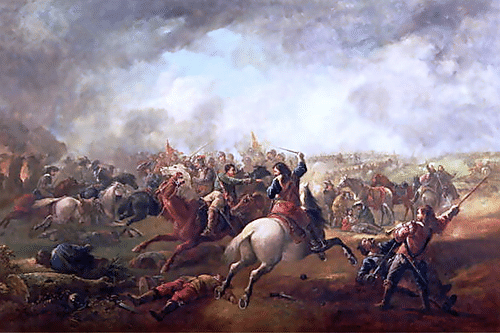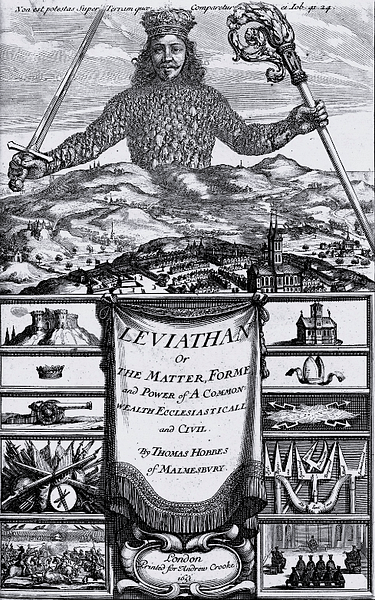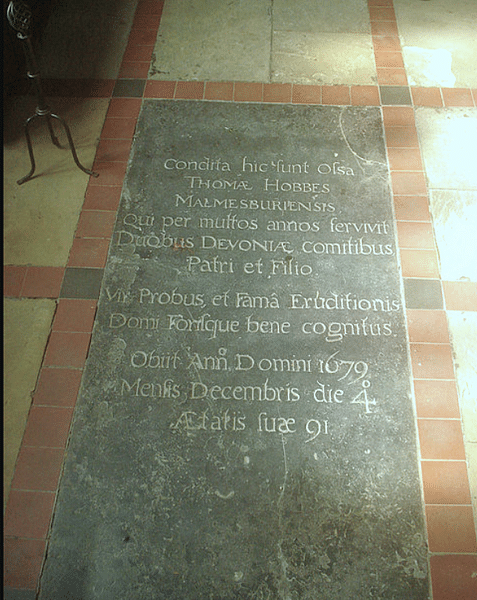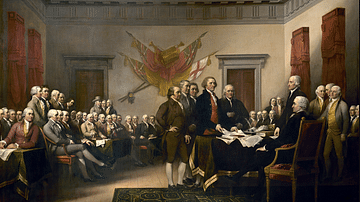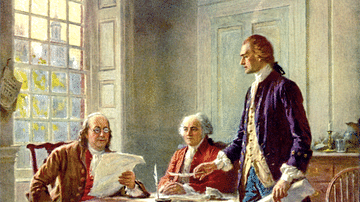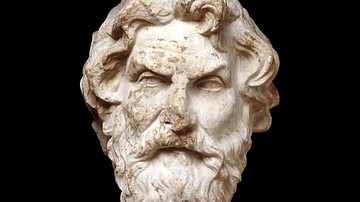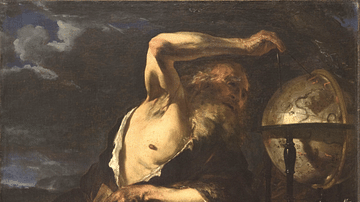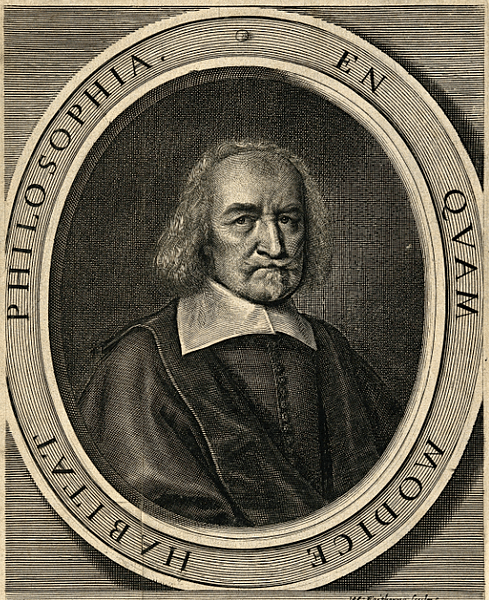
Thomas Hobbes (1588-1679) was an English philosopher who famously summarised his pessimistic view of human nature in his greatest work, Leviathan, published in 1651. Hobbes believed that the life of humanity in the state of nature is short and brutish, a situation that can be mitigated by people coming together and handing over some of their liberty to a strong political authority, which will act in their best interests.
Early Life
Thomas Hobbes was born on 5 April 1588 in Malmesbury in Wiltshire, England. Hobbes was "fond of the joke that his mother fell into labour with him on hearing the rumour of the Spanish Armada coming, 'so that fear and I were born twins together'" (Blackburn, 222). Although his family was not rich, Thomas did very well at school, particularly in languages and poetry. Thanks to funding from a wealthy uncle, Hobbes then studied at Magdalen College at the University of Oxford between 1602 and 1608.
Hobbes began to gather important connections when, in 1608, he started working for the statesman William Cavendish (1555-1626) as a secretary. He also had time to work on translations, notably producing an English translation of Thucydides' Peloponnesian War in 1629. The long-term relationship with the Cavendish family continued into the 1630s when Hobbes tutored Cavendish's son William, Earl of Devonshire (1617-1684), while travelling through France and Italy on several grand tours. In between, Hobbes had also worked as a secretary for the influential courtier and author Francis Bacon (1561-1626) in the 1620s. Hobbes was certainly keen to meet influential people in person. He met the famed astronomer Galileo Galilei (1564-1642) and the French philosopher René Descartes (1596-1650). Hobbes' connections only became more impressive over time. By 1646, he was working as the mathematics tutor to Prince Charles, future Charles II of England (r. 1660-1685). Hobbes kept this post for three years. The prince described Hobbes as "the oddest fellow he'd ever met," which was, as the historian A. Gottlieb notes, "one of the nicest things said about Hobbes" (36).
Unsurprisingly, Hobbes was on the side of the Royalists during the English Civil Wars (1642-1651), although, for most of that decade, he was in Paris to avoid his political, intellectual, and ecclesiastical enemies in England. The British royal family was also in exile there. The turmoil and bloodshed of the Civil Wars may well have affected Hobbes' view of human nature and sovereign power. The conflict resulted in around 200,000 military and civilian deaths, which, taken as a proportion of the then population, were greater than those sustained in the First World War (1914-1918). A more personal negative influence might have been Hobbes' experience with his own father, who was defrocked as a cleric after physically attacking a fellow clergyman in a graveyard of all places.
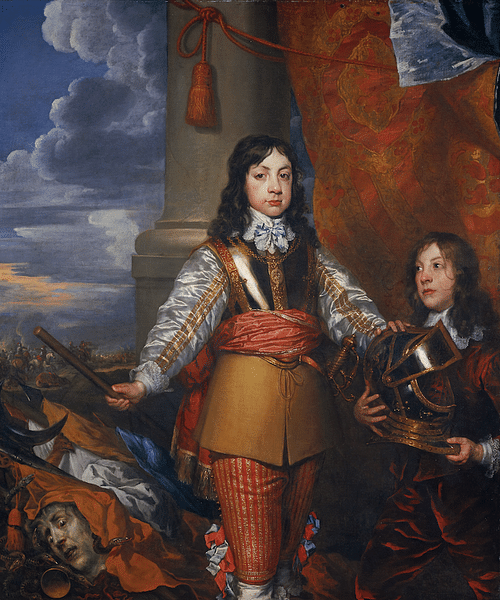
It was during this period in exile that Hobbes wrote his first philosophical work, Elements of Law, written around 1640 but not published until 1650. Hobbes also wrote The Citizen, published in 1642; Human Nature, published in 1650; On Matter, published in 1656; and On Man, published in 1658.
Leviathan
Hobbes made his most lasting impact on political philosophy in his Leviathan, published in 1651. The title is a reference to the fearsome sea monster that is described in the Bible's Book of Job, chapter 41. Hobbes is suggesting that the absolute power of the state he describes is like the great power this monster possesses. The work had a longer and more explanatory alternative title: The Matter, Form, and Power of a Commonwealth, Ecclesiastical and Civil.
Hobbes famously took a negative view of human nature and the human condition, stating that before societies were formed, in what he described as the state of nature, "the life of man [is] solitary, poor, nasty, brutish and short" (Leviathan, ch. 13). Hobbes believed that humans are driven by selfish and egoistic desires to satisfy their basic needs (e.g. food, warmth, and shelter) in order to be happy. Further, they also desire other things, such as fame, fortune, and influence. All of these must also be satisfied, even at a cost to others. For Hobbes, "men are continually in competition for honour and dignity…and consequently among men there ariseth on that ground, envy and hatred, and finally war" (quoted in Robertson, 265). For Hobbes, humanity's natural inclination is to make war. "Hobbes's pessimistic psychology, in which the dominant urge of self-preservation manifested itself basically as fear," strongly motivates his thinking in other areas (Hampson, 84).
Hobbes believed states were created in order to avoid the state of nature where there is continuous "war of every man against every man" (Leviathan, ch. 13). When people join together to form societies, they create a 'covenant' or social contract, which is a collective promise to abide by certain rules of behaviour. It is perhaps important to note that, for Hobbes, the social contract is not between citizens and the ruling authority but between the citizens themselves (other thinkers would extend the idea of a social contract to a binding agreement between ruler and ruled). He also notes that not everyone is bad: "the wicked were fewer than the righteous, yet because we cannot distinguish them, there is a necessity for suspecting" (Gottlieb, 60). In other words, because we live in perpetual fear of wicked individuals, that is, the threat of violence rather than actual violence necessarily (and this is really what Hobbes means by "war"), we must get together and form a society. A sovereign ruler is then necessary for that society in order to ensure the rules or laws are followed and that there is a more peaceful form of existence. Critics point out that there never was a clear point when humans left the state of nature and formed a society, and so the social contract idea is a total fiction.
Individual safety is guaranteed in Hobbes' vision of society by the state, but part of the price is a certain loss of individual freedom. The people must give up their free will to the state. This, and the fact that Hobbes believed the people can never dismiss their sovereign, seems to give such a ruler absolute power, a consequence that has troubled Hobbes' critics (and Hobbes himself). Hobbes clarifies the power of his sovereign by stating that only an absolute sovereign can guarantee that everyone abides by the laws. He also believes that the sovereign will act in the best interests of all and will represent the people's will; for this reason, and for its strength, a system of monarchy is better than one based on the aristocracy or a democracy.
Another advantage of a single ruler is that inside a group of rulers there would, because of Hobbes' view of human nature, inevitably be conflict between individuals and the power of the sovereign body would be compromised. Hobbes acknowledged that a single all-powerful sovereign might abuse their position, but this was, in any case, preferable to the chaos and violence of the state of nature or the inevitable chaotic breakdown of alternative political systems. Hobbes thought such an abuse unlikely since the sovereign was ultimately answerable for their actions to God in the next life. He also made the point that even if this flaw of abuse of power is admitted, it is, he argued, just as likely to occur in any other form of government. Later thinkers like Montesquieu (1689-1755) proposed a solution by separating powers in several different institutions, but Hobbes would have considered this as disadvantageous because dividing power would eventually lead to a civil war. Finally, and a point often ignored, Hobbes limits the sovereign's power to political and legal matters, he does not advocate they interfere in other areas like the arts.
Criticism
A major objection to Hobbes' social contract made by critics is if people really are only motivated by self-interest then it is difficult to see why they could ever compromise even the smallest amount of the freedom they enjoy in the state of nature in order to create a society in the first place. As Hobbes himself noted, such an individual "does but betray himself his enemy" (Leviathan, ch. 14). Hobbes does say that some (but very limited) 'rights' are never given up and are maintained by the citizen even under an absolute sovereign. Examples of these 'rights' are self-protection and prevention of self-harm. For example, a citizen can refuse the sovereign if they are requested to harm themselves physically or give testimony against themselves in a court of law.
Even if individuals did get together and give up their will to an all-powerful sovereign, some thinkers, notably John Locke (1632-1704), pointed out that life for some, especially a minority group, under a despotic ruler was no improvement on living in a state of nature. Locke also disagreed with Hobbes' view that people did not have any rights to property before they joined societies. Other thinkers suggested Hobbes' pessimistic view of human nature was just plain wrong, and, if so, then the state of nature was not necessarily all that bad, which then leads to the necessity that society and government must do rather more than simply protect people's physical safety if it is to be an improvement on that pre-societal state. Descartes was another notable critic, once stating that Hobbes' views on human nature "are extremely bad and quite dangerous in that he supposes all persons to be wicked, or gives them cause to be" (Gottlieb, 37). As we have seen, Hobbes did not believe everyone was wicked.
Hobbes, in giving primacy to the idea of self-preservation, rejects religion as a source of morality. The anti-Catholic sentiments expressed in Leviathan meant that it was safer for Hobbes to return from Paris to Protestant England. However, he won few friends in England for his stance against religious institutional interference in people's affairs and his idea that those of different faiths should be tolerated. Church leaders were not best pleased either with his pessimistic view of human nature, which strongly suggested God was an incompetent Creator. Since he denied free will and attacked the authority of the Church of England, Hobbes gained a reputation for being an atheist, which was not true, but the nickname stuck of "the Beast of Malmesbury".
The aristocracy did not like Hobbes either since he proposed that all were equal before the sovereign; he was against the prevailing idea that some people are born to rule and be more successful than others by right. Hobbes did not want to make everyone equal in terms of status and property ownership, but he did want to rid society of such conventions as gaining advantages over others because of one's parentage rather than one's talent.
Views on Science & Mathematics
Hobbes, always an admirer of geometry and mathematics, became interested in the brand new ideas of science and particularly mechanical philosophy. He wrote of his views in Of Body (De corpore), published in 1655. For Hobbes, matter and motion were sufficient to explain all visible phenomena, and all things visible were made up of tiny parts unseen to the naked eye (corpuscular theory). This even included God, who must, Hobbes thought, be made up of some sort of physical material, albeit a material unknown to us. Hobbes extended this idea of everything being made up of small parts to society and so believed that political institutions were simply a reflection of their individual members whose only self-interested desire was to survive.
Another influence on Hobbes' political philosophy was his great admiration of the geometry proposed by the Alexandrian mathematician Euclid (l. c. 300 BCE), as A. Gottlieb explains:
Hobbes was bedazzled by what Euclid had achieved in mathematics with the use of simple axioms and strict definitions, and he wanted to do something similar for politics. This is one of the main reasons why he was so often misunderstood.
(42)
Hobbes' poor public image was not helped by a long-running spat with the mathematician John Wallis over the validity of each other's theories on circles. Another public argument followed with the scientist Robert Boyle (1627-1691) over whether or not the latter had established a vacuum inside his celebrated air pump. Nor was Hobbes, an accomplished linguist, very impressed with the new jargon scientists were increasingly prone to using. He once stated in Leviathan that "words are wise men's counters, they do but reckon by them: but they are the money of fools" (Blackburn, 223).
These various faults, if indeed they were that, may explain Hobbes falling out of favour with other thinkers and so being excluded from the Royal Society. His reputation in the field of science certainly fared better on the Continent, where one of his more prominent admirers was the scientist and philosopher Gottfried Wilhelm Leibniz (1646-1716).
Major Works By Hobbes
The most important works by Thomas Hobbes include:
The Citizen (1642)
Elements of Law (1650)
Human Nature (1650)
Leviathan (1651)
Of Body (1655)
On Matter (1656)
On Man (1658)
Death & Legacy
Hobbes lived in semi-retirement in Devonshire in his later years, largely concentrating on his translation work. He died at the age of 91 near Hardwicke in Derbyshire on 4 December 1679.
Much of Hobbes' work, although inspiring discussion, was challenged during the Enlightenment because he did not allow for a more optimistic view of humanity as capable of benevolence and reason. Hobbes' link between a dark human nature and the need for absolute political authority was the very opposite of ideas proposed by philosophers like David Hume (1711-1776) and Jean-Jacques Rousseau (1712-1778). Hobbes emphasised the need for a strong authority, and so it is rather ironic that his innovative ideas on political philosophy often led to him being championed by radicals.
Hobbes' reputation did grow in the second half of the 18th century when perhaps the increasing political turmoil in Europe and elsewhere resulted in his negative view of human nature seeming more plausible. Hobbes' scepticism regarding human nature, rejection of metaphysical philosophy, and wariness of the power but also emptiness of words, has had lasting appeal for more pragmatic philosophers who seek to find practical solutions to everyday problems. Perhaps his greatest achievement, though, was to at least partially disentangle philosophy, morality, and politics from religion, an endeavour continued by the thinkers who followed him during the Enlightenment.
